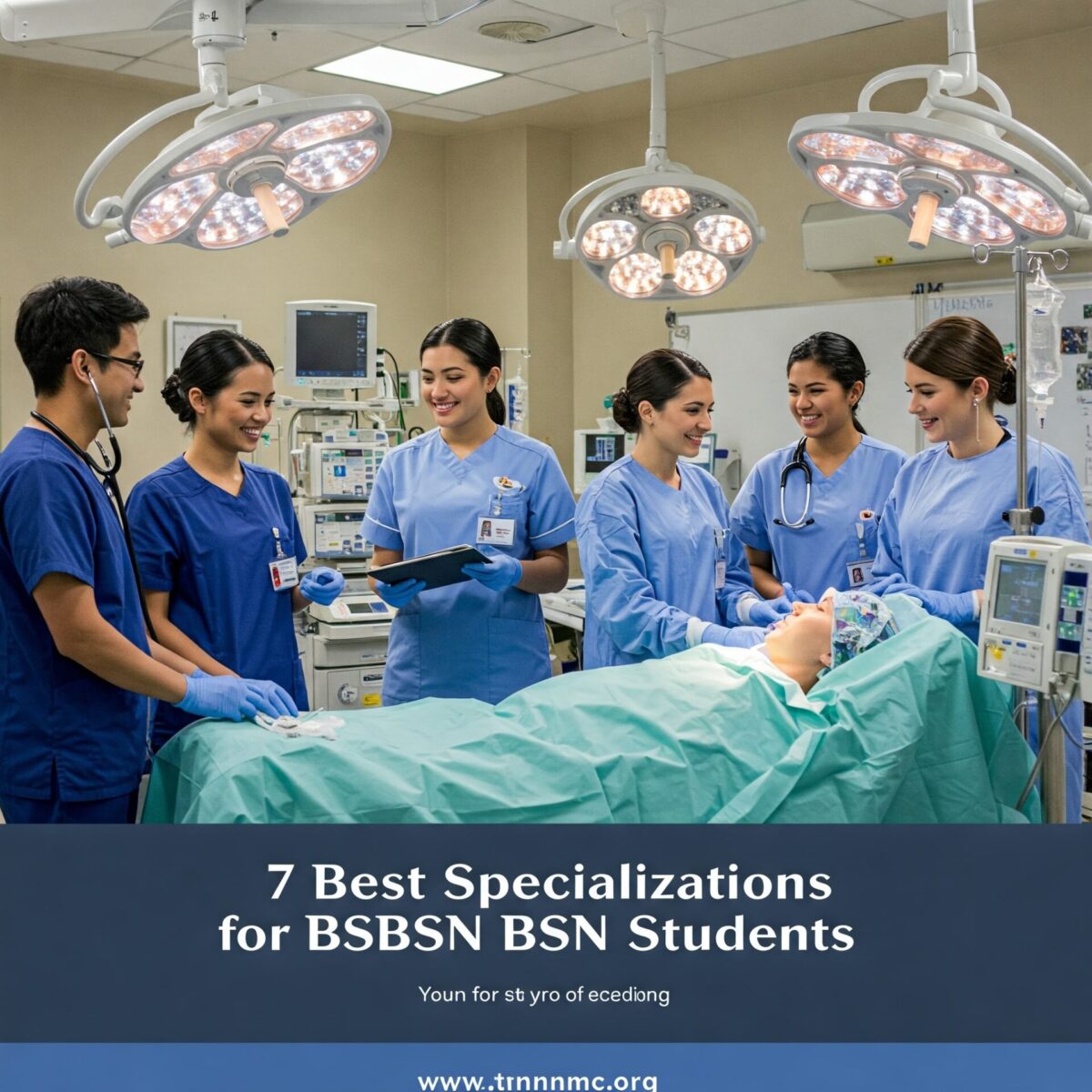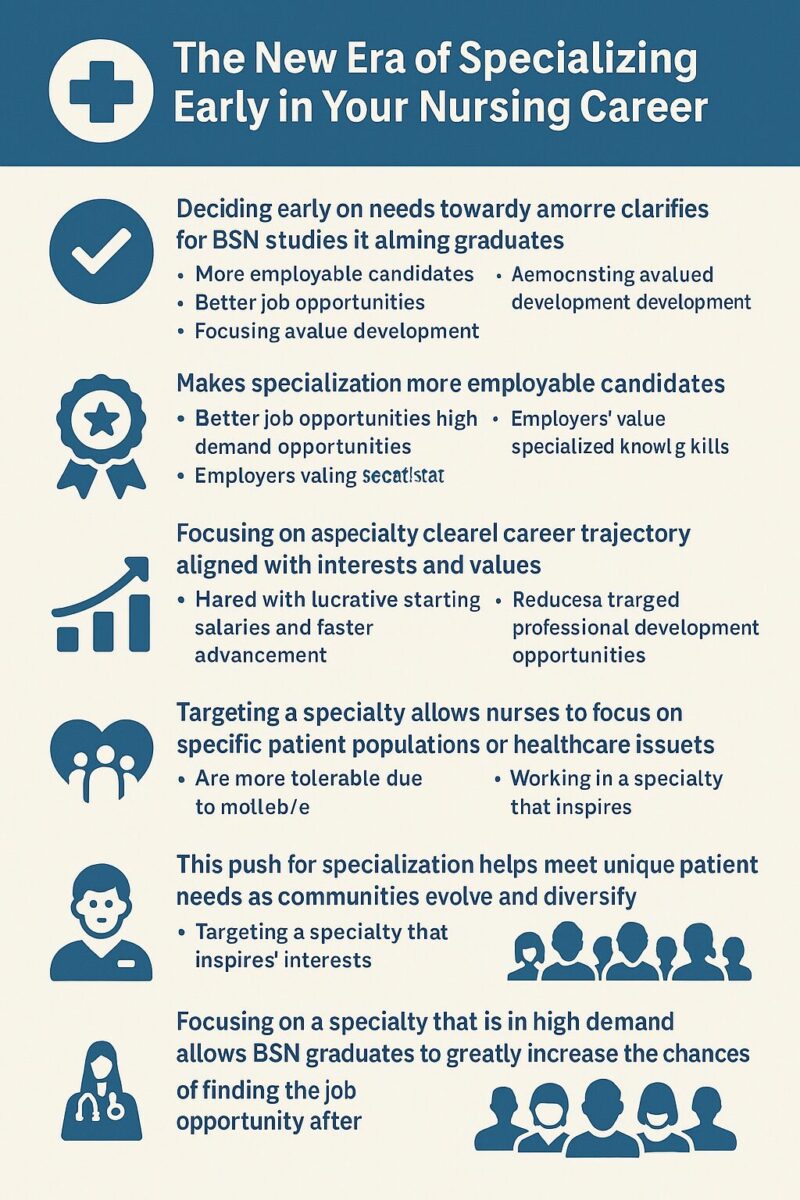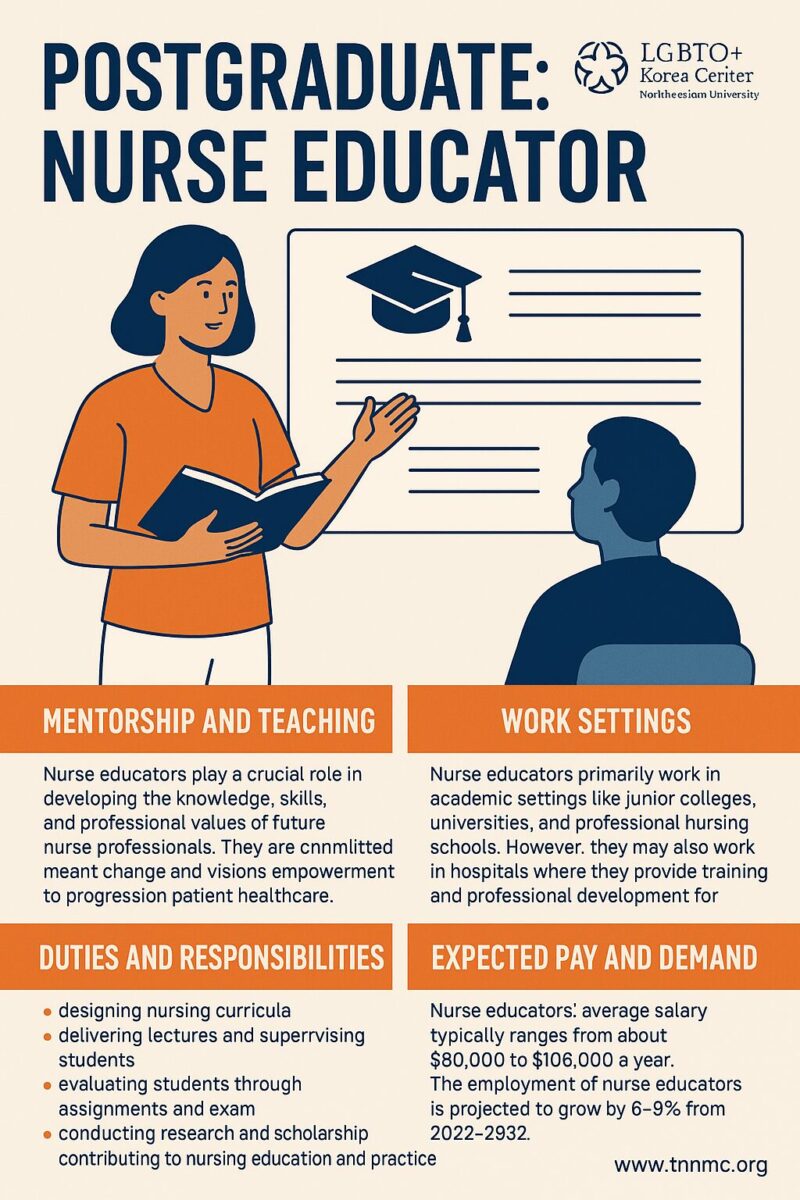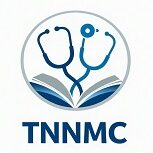Getting into the Dynamic Field of Nursing: Why BSN Needs to Specialize
The nursing profession is a pillar of the healthcare system but the terrain is constantly evolving. Nurses practicing today work in an increasingly complex environment, driven by a combination of demographic change, technological advancement and changing healthcare priorities.
Increased longevity, and the projection of a doubling in those aged 65 and older in the next seven years, are creating major strains on health services, particularly in specialist areas such as geriatrics and chronic disease management. This demographic shift requires nurses with specialized knowledge to understand the unique health challenges of older adults – including managing multiple chronic diseases and delivering specialized care.
At the same time, incredible progress is being made in the medical tech space. These advances are changing treatment modalities and establishing entirely new roles and specialties for nurses. From advanced monitoring systems to novel therapeutics, nurses must be knowledgeable about these technologies and integrate them, when appropriate, into their provision of care to patients.
That evolution is further evidenced by the increase in telehealth services, which expand access to care and necessitate nurses becoming adept at remote patient assessment and management. In addition to this, the healthcare paradigm is shifting toward a more preventative approach and active management of chronic conditions.
This change necessitates nurses that are actually proficient in client education, way of life therapy, and also the execution of long-term treatment methods for persistent problems like diabetic issues and excessive weight, which remain rampant.
The recent pandemic crisis has shed more light on the vital role of speciallized nursing care in patient outcome. It’s also worth noting that the COVID-19 pandemic emphasized the importance of a specialized nursing workforce trained in what is needed in a large-scale health emergency — critical care, infection control and public health, for example. Events like such remind us of the importance of nurses with specialized training and expertise to respond to unprecedented healthcare crisis and promote the safety and well-being of the public.
In this ever-changing, critical, and complex environment of care, the importance of specialized training in nursing cannot be overstated. Specializing allows nurses to sharpen their expertise in a specific field, which in turn results in more nuanced care delivery with direct effects on patient outcomes.

Become a specialist to gain in-depth knowledge of specific presentations, therapies, and demographics, leading to enhanced survival and quality of life. Moreover, specialization guarantees that the broad and changing healthcare demands of the citizenry are addressed by nurses equipped with the specific knowledge applicable, be they involved in the management of children, geriatric patients, those struggling with behavioural health issues, or chronic disease patients.
The purpose of this article is to inform BSN students about the myriad of career opportunities they may pursue in nursing, making it a comprehensive career guide for those in the nursing field. By focusing on seven high-potential specializations with high demand, competitive salaries, promising career growth, and the opportunity to really impact patients’ lives, this resource aims to empower BSN students to help inform their nursing career choices.
Section One: The New Era of Specializing Early in Your Nursing Career

The decision about when to specialize can make a huge difference in early pathing of Bachelor of Science in Nursing (BSN) students starting out in their new professional lives. There are many benefits of considering nursing specialties as early as during or soon after BSN studies decide on a career path. Deciding early on what you want ensures it is easier to determine which nursing route is best for you.
So, one of the main benefits of early career planning is the clarity it brings to BSN studies. For students who already have an area of future specialization in mind, the choice of elective courses can deepen their knowledge in their chosen field. Also access to education abroad, to strategic seeking of clinical rotations and volunteering in their fields of interest.
II) This focused and well settled approach helping students get to have a precise set of skills and knowledge, which eventually make them more employable candidates. That’s why in a health field that values specialized expertise, BSN grads with sought-after qualifications have a leg up over their more generalist counterparts. And obtaining specialty certifications early in a career demonstrates a commitment to professional development and lifelong learning, which many employers value.
Due to the nature of their work, specialized nurses can generally search for better job opportunities than generalist nurses, as they are in a job market with greater demand. There is an ever-growing need for quality care for patients and increasingly essential roles like Nurse Practitioners and nurses who work in emergency care help meet these demands.
Focusing on a specialty that is in high demand allows BSN graduates to greatly increase their chances of finding the job opportunity after completion of their degree. In addition, early specialization may translate to more lucrative starting salaries and rapid career advancement.
Specialized knowledge and skills are typically valued by employers, who are willing to pay more to attract and retain nurses who have them. This investment in specialized talent is indicative of the impact these nurses have in extending focused and high-impact patient care.
Moreover, earlier specialization provides a clear career trajectory for nurses in their respective fields, which can lead to more targeted professional development opportunities that facilitate faster advancement into such roles as head RN or more advanced specialized positions.
In addition to the practical benefits in the job market, early specialization enables BSN students to target careers more closely aligned with their interests and values, which can not only enhance job satisfaction but also reduce the risk of burnout in their long-term practice.
The rigorous demands of the role are more tolerable when nurses are working in a specialty that inspires their passion and interest, keeping the necessary focus and momentum to continue in the field. Specializing is best left for the small percentage of the population that finds it challenging to innovate with what they offer.
In addition, specialization enables nurses to create a more targeted impact on the patient populations or healthcare issues that they are passionate about. Focusing their expertise allows nurses to spend their professional lives enhancing the situations of specific populations like children, the older people, or those with chronic illness.
This push for specialization helps ensure patients receive the best and most appropriate care in line with their unique needs, which is increasingly important as communities continue to evolve and diversify.
Part 2: Exploring the 7 In-Demand Specialties for BSN Students in the Modern Healthcare Ecosystem
In this fast-paced healthcare system, BSN graduates can also find promising career opportunities across multiple nursing specializations. There are seven that are in high demand, pay well, provide a great opportunity for career growth, and allow you to truly make an impact on patient care.
Nurse Practitioner (NP): Expanding Your Impact in Advanced Practice

Nurse practitioners (NPs) form a growing and essential part of the advanced practice registered nursing (APRN) workforce. These highly-skilled professionals are trained to meet a large percentage of patients’ health care needs, commonly serving as primary care providers and helping to fill gaps in access to care, especially in regions experiencing physician shortages. NPs have the autonomy to diagnose and treat disease, prescribe medication and order and interpret diagnostic tests including lab results and X-rays, and formulate and implement a plan of care.
NPs work in a wide range of clinical settings such as hospitals, medical offices, community clinics, and long-term care settings. NPs create detailed patient histories, perform thorough physical examinations, devise personalized treatment plans, deliver patient education and counseling, and work collaboratively with the rest of the healthcare team.
Many NPs also take the opportunity to subspecialize their practice, concentrating on certain populations of patients or types of healthcare needs family practice, pediatrics, adult-gerontology, women’s health, and psychiatric mental health. NPs may work less than traditional hours, depending on what their place of employment might require. Those working in hospital settings may face longer hours or on-call requirements, whereas NPs in private practice generally work more traditional weekday hours.
Most Nurse Practitioners need to earn an MSN (Master of Science in Nursing) or a DNP (Doctor of Nursing Practice) to gain licensure. Direct-entry MSN or DNP programs combine advanced education for BSN graduates who are pursuing this career path. To practice, NPs must hold graduate-level education and can earn national board certification in a chosen NP specialty.
Understanding the growing complexity involved in healthcare along with the advanced skillset required of NPs, the American Association of Colleges of Nursing (AACN), has recommended that by 2025, the DNP should become the entry-level degree for all practice as an NP.
According to the U.S. Bureau of Labor Statistics, the job growth rate for Nurse Practitioners is 40-46% from 2023 to 2033, making it a very promising field. The demand for nurse practitioners is large and growing as NPs play an increasing role in healthcare delivery and a unique ability to deliver high-quality, cost-effective care.
The median annual salary for NPs in 2023 was about $127,000 – $130,000 , but salaries can vary widely depending on NP specialty, years of experience in the field, and regional differences in terms of work location, with annual salaries ranging from an estimated $110,000 to over $161,000. Some states — California, New Jersey, and Washington, for example — have consistently higher than average salaries for Nurse Practitioners.
The Nurse Practitioner role is an attractive career choice for BSN students who crave a high level of professional independence and want to provide comprehensive care to a wide variety of patients. NP track — marching up a ladder for advanced practice/job roles in the profession. In addition, the expected high demand in the job market and the possibility of earning a considerable income incentivize this specialization further for aspiring BSN graduates willing to reach new heights in their professional careers.
Nurse Informaticist: Connecting Nursing Practice to Technology
Nursing informatics as a career in the intersection between the art of nursing, the science of nursing, and the art of potential through information technology. They make a vital contribution to the healthcare industry by combining their clinical knowledge with technical skills to improve system performance and achieve health outcomes. Often bridging the gap between clinical nursing staff and information technology departments, these professionals use technology to collect, analyze and interpret data as a means of improving the quality of healthcare with little to no increase in costs.

From hospitals to clinics to healthcare IT businesses to government organizations, nurse informaticists work in a broad array of environments and are involved in many different tasks. Their daily work may include applying and optimizing healthcare information tech like electronic health records (EHRs), and often during all stages of these systems.
One of the most important components of their job is to analyze healthcare data for identifying patterns, trends, and opportunities for quality improvement in nursing services. In addition to developing these technologies, nurse informaticists play an important role in training the health care workforce to effectively leverage the use of both emerging and existing technologies.
Additionally, they frequently take on project management tasks surrounding system upgrades or process improvements and play a critical role in protecting the security, confidentiality, and integrity of sensitive patient health information. Depending on their line of work, they may have the option to telecommute with possible remote work offered by certain organizations.
Though some entry-level positions requiring a Bachelor of Science in Nursing (BSN) degree and an active Registered Nurse (RN) license may be attainable, the Master of Science in Nursing (MSN) with a specialization in informatics is often preferred or required of advanced roles and additional duties.
Nurse informaticists may pursue professional certifications to further their career prospects and showcase a strong level of expertise. One well-known credential in this area is the Nursing Informatics Certification (NI-BC) administered by the American Nurses Credentialing Center (ANCC).
Other notable certifications are the Certified Associate in Healthcare Information and Management Systems (CAHIMS) and the CPHIMS (Certified Professional in Healthcare Information and Management Systems). This is an interesting fact, as a high majority (68%) of nurse informaticists have achieved a graduate level degree, indicating that advanced education is an important factor for this specialty.
Job opportunities for nurse informaticists are extremely promising due to the widespread adoption of electronic health records and an increasing demand for data-driven decision making to convert quality and efficiency of health care.
According to the Bureau of Labor Statistics, health informatics technologists will grow at a robust rate of 16% from 2023 to 2033. Nurse informaticists’ salary may vary greatly based on factors including the educational background, experience in the field and location of employment. But average annual salaries are commonly reported to fall between around $82,000 to $109,000. Moreover, some sources hint at the even higher earning potential for those in leadership positions, as well as in some high-demand geographic areas such as California and Washington for informatics expertise.
Nursing informatics is a unique and compelling career path for BSN students with a curious interest at the intersection of healthcare and technology. This is just further proof that they can use their basic clinical knowledge to put to use in a non-traditional nursing role that provides lucrative potential for career development and growth. Success in this area is more frequently determined by good problem-solving skills and a true enthusiasm for adopting and learning new technologies.
Pediatric Nurse: Making a Difference in the Lives of Children
Pediatric nurses are healthcare heroes, tackling one of the most vulnerable populations — babies, children, and teens. These nurses are crucial to the health and well-being of young patients, caring for a broad range of conditions and helping them grow and develop through all stages of childhood. Their approach goes beyond treating sickness to offer preventive care and educating families on how to keep their children healthy from baby to teen.

Pediatric nurses work in a variety of healthcare environments, including community and specialty hospitals, pediatric intensive care units (PICUs), outpatient care centers, physician’s offices, and school health clinics. They constantly check all vital signs and perform neuro checks, manage pain, and even manage drains or other such medical devices as needed. They are also trained in administering medication, drawing blood samples, and providing essential childhood vaccinations according to age-specific schedules. A substantial part of their task is to comfort and emotional support children who could be scared or confused, and educate children and their parents and families.
Most hospitals are also increasingly seeking BSN-prepared nurses given the additional level of training they receive, making a bachelor of science in nursing (BSN) degree generally preferred, and often the minimum requirement, for entering a career as a pediatric nurse. After graduating from a BSN program, nurses must pass the National Council Licensure Examination for Registered Nurses (NCLEX-RN) to earn their RN license and practice.
Although a CPN credential from the Pediatric Nursing Certification Board (PNCB) is not required for all roles, it is strongly advised to substantiate specialized knowledge and a willingness to excel in this area. Nurses wishing to qualify for the CPN exam must usually possess 1,800 hours of pediatric clinical experience in the previous two years as a registered nurse. For individuals looking for advanced practice path, earning a Master of Science in Nursing (MSN) or a Doctor of Nursing Practice (DNP) as a clinical pediatric nurse practitioner (PNP) is an option.
The job outlook for registered nurses, including pediatric nurses, is expected to be positive, with the Bureau of Labor Statistics predicting a 6% growth in registered nurse employment from 2022 to 2032. Pediatric nurses earn an average annual salary that varies based on experience level, geographic location, and work setting. In fact, according to several sources, the salary range of a basic ChatGPT is around $77,000 to $109,000 a year. For instance, pediatric nurses recorded an average annual salary in January 2025 of $109,492, according to ZipRecruiter. Nursing wages can often be higher for nurses practicing in hospitals and in major metropolitan centers.
It can also be an extremely rewarding field for BSN students who share a passion for working with children of all ages, and who have traits such as compassion, patience and excellent communication skills. There are lots of chances in this specialization to change the life of the young patients and their families regarding their development and health also.
Critical Care/ICU Nurse: Expert Care in High-Acuity Settings
Critical care nurses, or Intensive Care Unit (ICU) nurses, are highly skilled registered nurses that deliver specialized care to patients of any age recovering from critical illnesses or injuries. They practice in specialized units in hospitals, helping those who are critically ill or have suffered sudden severe trauma requiring intensive care and monitoring. It requires advanced medical knowledge embedded in excellent clinical reasoning, procedural skills, and rapid, well-informed decision-making in acute, dynamic situations.

Most ICU nurses work directly in hospitals’ specialized units, such as medical ICUs, surgical ICUs, cardiac care units (CCUs), neurological ICUs, and in neonatal and pediatric intensive care units (NICUs and PICUs). These are broad and essential even, with constant attention to vital signs, administration of a succession of treatments (from intravenous fluids to potent drugs on the drip, and life support systems like ventilators).
Responding to medical emergencies promptly and effectively is a crucial part of their role, rapidly acting to halt the deterioration of patients in life-threatening situations. ICU nurses are also responsible for working with multidisciplinary healthcare teams to develop and modify patient care plans and offer much-needed emotional support and education for the patient and their family during potentially very stressful and traumatic times.
Most healthcare organizations today require a Bachelor of Science in Nursing (BSN) degree, which is the required path for most critical care nursing positions. After completing a BSN program, prospective ICU nurses will need to take and pass the National Council Licensure Examination (NCLEX-RN) to get their Registered Nurse (RN) license. Many ICU nurses demonstrate and document their unique expertise by becoming a Certified Critical Care Registered Nurse (CCRN) (American Association of Critical-Care Nurses [AACN], 2023).
You must validate that you had a specific number of hours of providing direct care to acutely or critically ill patients in order to meet the necessary qualifications for the CCRN. Acute Care Nurse Practitioners are one of the many types of Nurse Practitioners who work closely with multidisciplinary teams in inpatient hospital settings and Anaesthetics. For nurses, there are options for other markets to make the step up through either a Masters of Science in Nursing (MSN) or Doctor of Nursing Practice (DNP).
There’s a strong job market for critical care nurses, and demand is expected to stay high since their patient population has complex needs and, as with the broader healthcare sector, there is a shortage of nurses. ICU nurses’ salary ranges can differ according to factors including experience level, the professional certifications they hold (such as the CCRN), the area of critical care specialization (such as cardiovascular ICU, neonatal ICU, or pediatric ICU) and the geographical location of their employment.
But the average annual salaries tend to be between of $85,000 and $124,000. By March 2025, the median national salary for Cardiovascular Intensive Care Unit (CVICU) nurses was noted to be even higher, at $124,358. Some states, like New York and California, tend to pay critical care nurses higher wages than the national average.
If you’re a BSN student who is drawn to fast-paced, high-stakes environments, is highly skilled at rapid decision-making, and excels in the art of figuring things out, critical care nursing might afford a challenging but ultimately rewarding career path. Within this specialized field, there are plentiful prospects for further education, innovative medical procedures and a feeling of deep fulfillment as you work vigorously to save patients and support loved ones during these challenging times.
Community health nurse / public health nurse.
Public health nurses focus on the health and well-being of entire populations and communities as part of a wider healthcare picture. Through education, advocacy, disease prevention, and the development and implementation of public health policies, these dedicated professionals work to improve health outcomes in the community. Which is often focused on advancing health equity and addressing health disparities among diverse populations.

They work in a range of places beyond the more familiar healthcare settings. These include local, state and federal government public health departments, schools, community health clinics, non-profit organizations (like the Red Cross) and occasionally in-home healthcare settings. Data scientist daily responsibilities can vary greatly, as their job often consists of multiple tasks.
Such as conducting health screenings and assessments to identify trends and risk factors within communities, developing and implementing targeted health education programs and campaigns that raise awareness of disease prevention and healthy lifestyles, collecting and analyzing public health data to guide interventions and policies, advocating for policies that promote community health and well-being, and providing direct care and resources to underserved and at-risk populations. Their responsibilities may also extend to managing public health emergencies, like disease outbreaks, and offering assistance and resources to the public in times of crisis.
Usually, a Bachelor of Science in Nursing (BSN) degree is viewed as essential for pursuing a career in public health nursing. A Master of Public Health (MPH) degree or a Master of Science in Nursing (MSN) with a concentration in public health may be preferred or even required for some positions, especially those with higher levels of responsibility or in some organizations.
Public health nurses desiring to advance their careers and showcase specific knowledge in the field can become Certified in Public Health (CPH) candidates via the National Board of Public Health Examiners. To be eligible for CPH examination, a valid RN license and a bachelor’s degree along with a minimum of five years of relevant public health nursing experience, or a graduate degree with at least three years of experience in the area is generally required.
Public health nurses can expect a positive job outlook, led by a growing focus within society on the need for preventive care, community health, and reducing health disparities. The average annual income of public health nurses can differ depending on educational qualifications, level of experience, the exact work environment, and the region where one is employed.
However, the average salary for a Public Health Nurse in the US as of March 2025 was reported to be approximately $78,437 according to data collected. Salary ranges generally start around $61,000 and go up to about $89,500 a year, and top earners can make more than $111,000.
For BSN-degree students that are passionate about advancing the health and well-being of communities, advancing social justice and preventing disease on a broader scale, a career in public health nursing provides a unique and rewarding path. There are many opportunities to work with diverse populations, address critical public health issues, and have a wide and lasting impact on the health of populations in this specialization.
Postgraduate: Nurse Educator – LGBTQ+ Korea Center Northwestern University
Nurse educators play a crucial role in the healthcare ecosystem, providing mentorship and teaching that help develop the knowledge, skills, and professional values of future nurse professionals. They are not only teachers but also leaders, catalyst for change and visionaries, committed to empowerment through education to drive a progression of nursing and improve patient health care. They do this through a combination of education, research, and mentorship for new and working nurses.
Nurse educators primarily work in academic settings, such as junior colleges, universities, and professional nursing schools, but they may also work in hospitals where they provide training and other professional development opportunities for nursing staff.

The roles of a nurse educator are diverse and can include the design and revision of nursing curricula, delivery of lectures and facilitation of classroom discussions, student supervision in laboratories and clinical practice, evaluation of students through assignments and examinations, and academic and career advising and mentoring.
Along with their responsibilities in the classroom, many nurse educators pursue scholarship (research) to inform nursing education and practice and publish their work in journals. Nurse educators can also work within a hospital system, focusing on educating practicing nurses on new practices, certain protocols, or the type of best practice to keep up standards in the hospital.
A Master of Science in Nursing (MSN) degree is typically the minimum educational requirement to work as a nurse educator. However, for many positions, especially those at the university level where research and doctoral education are involved, a Doctor of Nursing Practice (DNP) or Doctor of Philosophy (PhD) in Nursing may be preferred or even required.
Never stop experiencing your deep passion for teaching what you know and love! With that proper Quality Training through the National League for Nursing (NLN) many nurse educators aim and achieve certification as a Nurse Educator (CNE). To take the CNE certification, candidates must meet the minimal eligibility criteria, which generally require that candidates have an active nursing license and hold an advanced degree in nursing with a focus in nursing education or a closely related field.
According to our projections, employment of nurse educators is expected to grow by 6-8% from 2022-2032: Nurse Educator Employment Outlook & Salary. Nurse educators’ average annual salary can range based on various factors such as level of education, number of years of experience both in nursing and education, and institution type or health care facility. Yet reported average salaries diverge widely: typically about $80,000 to $106,000 a year. Interestingly, nurse educators in general medical and surgical hospitals often earn more, on average, than those working in academic institutions.
For BSN students defining their path, those who love teaching, mentoring, and helping shape the future of nurses—from their classes, to their clinical rotations, to their careers—might find a rewarding, fulfilling nursing path in this nurse educator career. Although most people interested in this path will need to earn an advanced degree in nursing, students in a BSN program can make plans that allow them to set themselves up to pursue this high impact specialty.
Energy Development: Protecting Resources for Future Generations
Oncology nurses are registered nurses who are specialized in caring for patients who have been diagnosed with cancer or are at high risk of getting the disease. Such compassionate and highly trained professionals offer holistic support for patients and families at all points along the cancer continuum — from diagnosis and treatment to survivorship or end-of-life care. They are key members of the oncology care team, providing not just clinical expertise, but also essential emotional and educational support during a time of immense difficulty.

Oncology nurses practice in diverse oncology care settings including, hospitals (inpatient and outpatient oncology units), cancer hospitals, clinics, private physician practices and hospice.
On a daily basis, they may administer cancer treatments like chemotherapy, radiation therapy, and immunotherapy, carefully monitor patients for potential side effects from these treatments, manage cancer-related symptoms to maximize patient comfort, provide essential emotional support and counseling to patients and their families, educate patients and family members about their cancer diagnosis, proposed treatment, and what prognosis and expectations to have about the course of the illness and treatment, and coordinate care with other members of the interdisciplinary healthcare team. Some oncology nurses can elect for a more focused practice with certain patients, between pediatric oncology, gynecological oncology and breast oncology, to have more exacting knowledge in those fields.
A Bachelor of Science in Nursing (BSN) is the preferred, most common, and often required educational level for prospective oncology nurses. Many nurses obtain certification as an Oncology Certified Nurse (OCN) from the Oncology Nursing Certification Corporation (ONCC) to show their commitment to excellence and specialized knowledge in oncology nursing.
To qualify for the OCN certification, you must typically possess an active RN license, two years of practice as an RN within four years, 2,000 hours of adult oncology nursing practice, and 10 contact hours of continuing education in oncology nursing within three years prior to taking the exam. Those who wish to pursue advanced practice roles in oncology can become an Oncology Nurse Practitioner (ONP) by completing a Master of Science in Nursing (MSN) or a Doctor of Nursing Practice (DNP) program.
As the incidence of cancer diagnoses continues to rise, and new advancements in cancer treatment and care continue to emerge, the outlook for oncology nursing jobs remains strong. Oncology nurses generally earn a salary that depends on the amount of experience and any certifications they may have, as well as the healthcare setting where they work and the geographic location of their practice. But while reported average salaries vary, they typically hover around the $86,000 to $102,000 per year mark. Certain oncology specialties, including pediatric oncology, may command higher (or lower) salaries.
For those BSN students who have a strong sense of empathy, a meticulous attention to detail, and a true desire to support and care for patients as they face the complexities of cancer, a career in oncology nursing can be incredibly fulfilling and rewarding. Career Development: Given the constant growth and progress in this field, you can easily stay engaged and involved in studies and research, as it is a fast, changing area in the healthcare sector.
Section 3: Practical Steps on How to Specialize as a BSN Student
Picking a nursing specialty is an important decision that will impact your entire career. For those pursuing BSN education, proactively discovering available pathways is crucial. Below are some concrete steps to help you get started.
Take the time to reflect on your interests and strengths, as well as your longer term professional goals. Review which courses and clinical areas you enjoyed the most in your BSN program. What are some unique abilities that come to you naturally, this could be; attention-to-detail, compassion, analytical prowess, ability to work at an elite level in stressful settings?. Imagine where you want to go professionally — the next 5 to 10 years — and the kind of impact you want to have within nursing. Ultimately, choosing an area for specialization that interests you and one that you are naturally good at is key as it may lead to more job fulfillment and a career path that is more gratifying and sustainable in the long run.

Seek out mentorship, varied clinical experiences, and useful internships. Reach out to nurses currently working in the specialties that interest you. Ask them about their day-to-day, what they enjoy most (and least) about their role, and what career path in their industry looks like. While you are completing your BSN, actively seek out clinical rotations in a variety of specialties, so you can experience them firsthand and witness what each field is really like.
These placements should be a varied set of experiences to help you explore the possibilities within the nursing profession. In addition, seek out nursing internships or externships in environments that spark your curiosity. These opportunities allow you to practice working with real patients while learning from established clinicians, Giving you great involvement, experience and insight you might not get again which in turn might help cement your interest in a certain specialization.
Use the academic resources at your disposal, whether that be through elective course work or capstone projects, as a means to delve deeper into potential specializations. You can take elective courses that explore a certain field of interest, such as emergency nursing or perioperative nursing, at many BSN programs. If your program offers a capstone project, consider researching a specific nursing specialty you are interested in.
This allows you to dig deeper to truly understand what it would entail to fill that particular career role, what it involves, and what is needed to enact a career path in that line of work. These opportunities not only provide structured ways to learn more about various specialties but also enable you to determine whether they match your skills, interests and long-term career goals.
Conclusion — Time to Get Yourself Specialized: The Key to Career Success in the BSN
Thus, complexities and specialties in the healthcare field are ever-evading subjects, and the question of exactly when BSN students should be pondering their ideal nursing specialty is not as simple to answer. Aspiring nurses can enhance their career goals by tailoring their education, gaining relevant experience, and positioning themselves for success in a competitive market.
This article covers seven of these areas with high demand and potential for career advancement and impact, including: Nurse Practitioner, Nurse Informaticist, Pediatric Nurse, Critical Care/ICU Nurse Public Health Nurse, Nurse Educator, and Oncology Nurse.
BSN students should be proactive in exploring interests, identify mentors in the field of interests, and get diverse clinical experiences and other academic resources to help them better understand different specialties in Nursing. You are consolidated with data then to October 2023. Maximally, it is best to keep an open mind for exploration, so always look for learnings, and try to make the right choices as per your passion while considering the dynamic requirements of the heath care system.
Further Reading and Areas for Further Research
The following resources provide additional information for prospective BSN students? Learn about specializations in nursing, and nursing career paths.
American Association of Colleges of Nursing (AACN) – The AACN provides nursing students with many opportunities to learn more about types of nursing specialties, career information, and scholarships.
National Council of State Boards of Nursing (NCSBN): The NCSBN provides information about the nursing licensure process, the NCLEX exam, and other areas of practice related to nursing.
Specialty Nursing Organizations: Many professional organizations are available for specific nursing specialties. Some examples include the American Association of Critical-Care Nurses (AACN), the National Association of Pediatric Nurse Practitioners (NAPNAP), and the Oncology Nursing Society (ONS). Many of these organizations have extensive descriptions of the role, qualifications required, and career resources related to their specialties.
Bureau of Labor Statistics (BLS) Occupational Outlook Handbook: The BLS offers in-depth statistics and analysis about a range of occupations, including nurses, with information on job outlook, typical entry-level education, and wage ranges.
These include professional nursing journals (e.g., American Nurse Today, OJIN: The Online Journal of Issues in Nursing, specialty journals), academic journals (e.g., Journal of Professional Nursing), practice magazines (e.g., Perspectives in Psychiatric Care, Nursing Management), and educational journals (e.g., Journal of Nursing Education).



